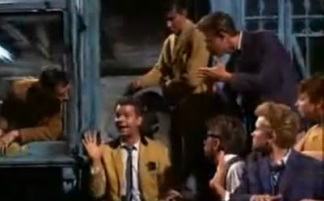 The Jets sing "Gee, Officer Krupke" in West Side Story. Tags: children/youth, crime/law/deviance, juvenile delinquincy, subtitles/CC, 00 to 05 mins Year: 1961 Length: 5:44 Access: YouTube Summary: Why do people break society's laws and norms? In this scene ("Gee, Officer Krupke") from the musical West Side Story, members of a gang (the Jets) are confronted by a police officer who sees them as trouble makers. After he leaves, the men mock various authority figures by sarcastically singing about the causes of their behavior. For example, they sing "all our mothers are junkies ... we're misunderstood ... deep down inside us, there is good ... my parents treat me rough ... they didn't want to have me ... we're psychologically disturbed." Despite their sarcasm, they accurately identify the various reasons that psychologists, judges, social workers, and society more generally gives for explaining crime and deviance, further noting "juvenile delinquency is a social disease." As an intro to teaching a module on Crime & Deviance I regularly introduce the idea that there is more than one point of view of why people offend. I ask students before and after showing the clip to mind map as many reasons as they can think of as to "Why do People Offend?" Viewers may be encouraged to identify the various factors shaping crime and deviance, and how people perceive these factors from different social positions. Going deeper, we can also consider the role of reflexivity in their actions. What does their sarcasm say about these causes and their attempt to understand them? In his essay, “Some Politically Incorrect Reflections on Violence in France and Related Matters,” Slavoj Zizek argues this about violent offenders: "when really pressed for the reasons for his violence, and if capable of minimal theoretical reflection, he will suddenly start to talk like social workers, sociologists and social psychologists, quoting diminished social mobility, rising insecurity, the disintegration of paternal authority, the lack of maternal love in his early childhood… in short, he will provide a more or less precise psycho-sociological account of his acts so dear to enlightened liberals eager to 'understand' the violent youth as a tragic victim of their social and familial conditions." As noted in The Kugelmass Episodes, "the members of the Jets can easily re-frame their own experiences to win the maximum of sympathy from each successive 'handler' ... [but] the Jets aren’t simply making fun of the notion of delinquency. They are genuinely confused about their own actions, and suspect that somebody educated has the answer, but meanwhile there is a fundamental and unresolvable problem: the Jets like their gang, and the people in authority don’t." Submitted By: Stephen Base
2 Comments
Manuel Franco
7/29/2023 03:05:23 am
I just want to say Thank You to everyone who supported me through the years. My name is Manuel Franco, New Berlin, Wisconsin. My story of how I won the Powerball lottery of $768.4M is a bit of a tale. I have been playing Powerball tickets for 6 years now since I turned 18. I bought my first ticket on my 18 birthday. I was feeling very lucky that day because I had contacted Dr. Odunga Michael to help me with the winning Powerball numbers. I really had that great great feeling that I looked at the camera wanting to wink at it. I only did a tiny part of it and trusted him. He gave me the numbers after I played a couple other tickets along with it for $10. I checked my ticket after the winnings came online and saw the numbers were correct including the Power play. I screamed for about 10 minutes because it felt like a dream. I had won $768.4M. You can check my winning testimony with the lottery officials just with my name search. Thank you Dr Odunga. Well, his email is [email protected] and you can also call or Whats-app him at +2348167159012 so you guys can contact him
Reply
mark hold
7/8/2024 12:55:02 am
Herbal Penis Enlargement product is 100% guaranteed to Enlarge and get a better ERECTION, the reason why most people are finding it difficult to enlarge Penis is that they believe in medical reports, drugs and medical treatment which is not helpful for Penis Enlargement. Natural roots/herbs are the best remedies which can easily Enlarge your Penis permanently Contact Dr MOSES BUBA via Email: [email protected] or via WhatsApp: +2349060529305. for Natural root and herbal remedies put together to help Enlarge manhood and Erect healthily. I also learn that Dr MOSES BUBA also can cure other types of diseases, HEPATITIS B,DIABETICS,CANCER,HPV,LOW SPERM CAM, HIV/STDS, FIBROSIS LOST OF WEIGHT, BREAST ENLARGEMENT, HIPS and BUMS ENLARGEMENT etc .
Reply
Leave a Reply. |
Tags
All
.
Got any videos?
Are you finding useful videos for your classes? Do you have good videos you use in your own classes? Please consider submitting your videos here and helping us build our database!
|
 RSS Feed
RSS Feed
